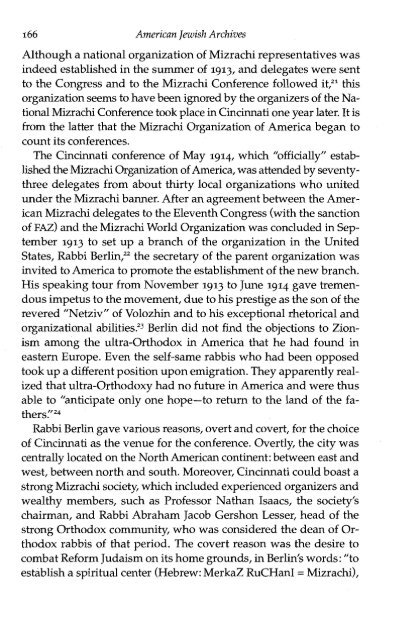You also want an ePaper? Increase the reach of your titles
YUMPU automatically turns print PDFs into web optimized ePapers that Google loves.
166 <strong>American</strong> <strong>Jewish</strong> <strong>Archives</strong><br />
Although a national organization of Mizrachi representatives was<br />
indeed established in the summer of 1913, and delegates were sent<br />
to the Congress and to the Mizrachi Conference followed it:' this<br />
organization seems to have been ignored by the organizers of the Na-<br />
tional Mizrachi Conference took place in Cincinnati one year later. It is<br />
from the latter that the Mizrachi Organization of America began to<br />
count its conferences.<br />
The Cincinnati conference of May 1914, which "officially" estab-<br />
lished the Mizrachi Organization of America, was attended by seventy-<br />
three delegates from about thirty local organizations who united<br />
under the Mizrachi banner. After an agreement between the Amer-<br />
ican Mizrachi delegates to the Eleventh Congress (with the sanction<br />
of FAZ) and the Mizrachi World Organization was concluded in Sep-<br />
tember 1913 to set up a branch of the organization in the United<br />
States, Rabbi Berlin? the secretary of the parent organization was<br />
invited to America to promote the establishment of the new branch.<br />
His speaking tour from November 1913 to June 19x4 gave tremen-<br />
dous impetus to the movement, due to his prestige as the son of the<br />
revered "Netziv" of Volozhin and to his exceptional rhetorical and<br />
organizational abilities.'3 Berlin did not find the objections to Zion-<br />
ism among the ultra-Orthodox in America that he had found in<br />
eastern Europe. Even the self-same rabbis who had been opposed<br />
took up a different position upon emigration. They apparently real-<br />
ized that ultra-Orthodoxy had no future in America and were thus<br />
able to "anticipate only one hope-to return to the land of the fa-<br />
thers."'4<br />
Rabbi Berlin gave various reasons, overt and covert, for the choice<br />
of Cincinnati as the venue for the conference. Overtly, the city was<br />
centrally located on the North <strong>American</strong> continent: between east and<br />
west, between north and south. Moreover, Cincinnati could boast a<br />
strong Mizrachi society, which included experienced organizers and<br />
wealthy members, such as Professor Nathan Isaacs, the society's<br />
chairman, and Rabbi Abraham Jacob Gershon Lesser, head of the<br />
strong Orthodox community, who was considered the dean of Or-<br />
thodox rabbis of that period. The covert reason was the desire to<br />
combat Reform Judaism on its home grounds, in Berlin's words: "to<br />
establish a spiritual center (Hebrew: MerkaZ RuCHanI = Mizrachi),

















